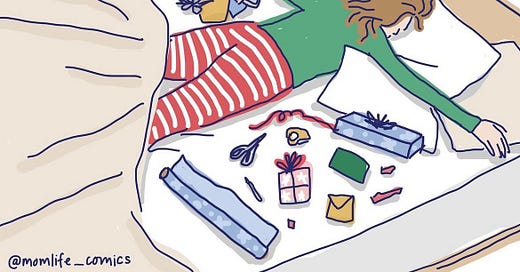Are you having fun yet?? Hanukkah is underway and Christmas is almost here. It’s a wonderful, joyful time of year, and it’s also—at times—exhausting and overwhelming.
In this newsletter, I talk a lot about dualities—stillness and movement, ambition and ambivalence, reactivity and proactivity. In my tagline, I say that I write for working moms (and enlightened dads and grandparents) who value professional success and being an involved parent. And so, this week, I encourage you to acknowledge the dualities inherent to this time of year. I hope you embrace both time with family and community, while also carving out time for solitude and reflection.
Personally, I’ve been reflecting a lot on this newsletter, which is coming up on its first birthday in January (!!!) As I’ve said before, one of the great joys of writing this has been having the opportunity to get to meet and interview incredibly generous, brilliant, and thoughtful working moms. This week I thought it would be fun to do a summary post for years-end. I’m rounding up my favorite pearls of wisdom specifically on working parenthood from some of the interviews I’ve done this year. I hope you enjoy!
Bar Rucci, founder of The Creativity Project and author of ArtBar blog, on what really matters
“I think the most important thing that I’ve learned as a working mom is that our children don’t really need all that much from us. Through the generations, children’s needs haven’t changed. They still long for love, connection, and belonging, and those things don’t have to be complicated.
Simple traditions and rituals, like a trip to the library and time spent snuggled up reading, or getting out in nature and collecting leaves and sticks for art projects, or cooking together, dancing together, telling jokes, or playing sports together - anything that peaks your interest also - seem doable and easy so we often forget that this is really the key to a happy childhood. We don’t need to make their days amazing, we just need to show them that they are important to us and that we are available to listen and connect.”
Zoe Chance, Yale School of Management professor and author of Influence is Your Superpower, on the power of cutting yourself some slack:
“Oh, my God—lower your standards for yourself as a mom. It's such a favor to your kids, and especially your daughters, if you don't try to be perfect. I just want to acknowledge for all working parents, and especially working moms—this stuff is just hard and there are days that we're going to suck at it.”
“For decades the women’s empowerment playbook has focused on fixing the woman – not the system. It was lean in, color code your calendar, get a mentor, get a sponsor. And I was an evangelist for this—I spent 10 years telling women to barnstorm their way into the corner office. But I was wrong, because even with all of the tips and empowerment sessions out there, women are still not where we should be.
I learned the hard way that having it all was just a euphemism for doing it all. I was running Girls Who Code, with a newborn, virtual schooling a kindergartner in the middle of the pandemic, and it nearly broke me. I looked around and saw that America’s moms are in crisis. We don’t have the social support that other countries do– shamefully we’re the only industrialized nation without paid leave. Our social safety net are moms. And it made me so mad, that the government was bailing out airlines, but not moms.”
“We believe it's okay, even admirable, to tell our kids "we have to work" and it's okay to tell our clients "we have to mom". Working women historically have been encouraged to deny their home lives and say yes more than no, but we believe in setting boundaries to give our “yesses” more power and our clients and kids the time they deserve.”
Jennifer Petriglieri, associate professor at ISEAD and author of Couples That Work, on what she wants to teach her kids about working parenthood
“I remember learning this from my parents, but I want [my kids] to know that work is fun. I think very often we teach our kids, "Ugh, I'm working so hard and it's bad." And I think what kids learn is, "Oh my goodness, work is this thing I have to do, but it's not that great." And of course sometimes it's not that great, but work is also something we enjoy doing. And that does not mean we don't enjoy being with them, but it means we have other aspects of our lives that we enjoy. And I think particularly as children become teenagers, that's a really important message for them to understand.”
I also wanted to highlight some other great interviews I’ve done this year, including:
Amy Tyson, Deputy Director of Everyschool, on tacking the digital dilemma in schools.
Kate Daderko, clinical psychologist, on supporting kids’ mental health.
Sarah Miller, author of the Substack newsletter Can we read? on raising readers.





